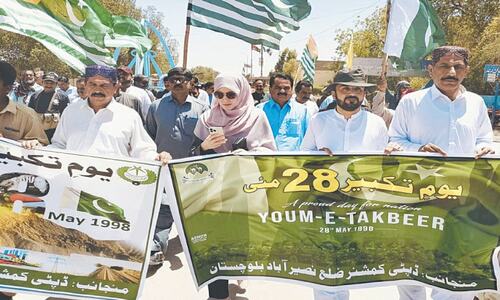• NCA adviser Kidwai hints at using emerging technologies to strengthen country’s nuclear programme
• Remarks come against backdrop of assertions about Islamabad’s N-capabilities during Indian elections
ISLAMABAD: Adviser to the National Command Authority Lt Gen (retd) Khalid Ahmed Kidwai has underscored Pakistan’s stance on not committing to the No First Use (NFU) policy regarding nuclear weapons.
Speaking at a seminar held at the Centre for International Strategic Studies (CISS) to commemorate Youm-i-Takbeer, the anniversary of the 1998 nuclear tests, Gen Kidwai, who has served as the director general of Strategic Plans Division (SPD), said: “Pakistan does not have a No First Use policy, and I’ll repeat that for emphasis. Pakistan does not have a No First Use policy.”
The NFU refers to a country’s stance and is regarded as an assurance that its nuclear arsenal is meant for deterrence, not fighting a nuclear war.
Islamabad has traditionally maintained ambiguity regarding the NFU policy due to New Delhi’s declared stance on the same, though Pakistani strategists were always sceptical, viewing India’s policy as more rhetorical than genuine.
The scepticism towards Indian intentions stems from ambiguities in India’s NFU doctrine. This policy includes provisions that permitted nuclear strikes against nuclear-armed states or their allies under perceived threats. Such exceptions implied a willingness to pre-emptively use nuclear weapons in specific scenarios, undermining the fundamental principle of NFU.
Recently, there has been a noticeable shift in India’s nuclear policy from a traditional NFU stance towards a more assertive nuclear posture. This internal debate in India regarding the revision of its NFU policy has compelled Pakistan’s military leadership to implement countermeasures, aiming to diminish any ‘perceived incentive’ India might have to execute a pre-emptive first strike against Pakistan.
“The Indian gung-ho leadership may like to think about it there should never ever be a doubt in anyone’s mind, friend or foe, that Pakistan’s operationally ready nuclear capability enables every Pakistani leader the liberty, the dignity and the courage to look straight into the Indian eye and never blink,” Gen Kidwai further said.
His statement has come against the backdrop of contentious discussions about Pakistan’s nuclear programme during the ongoing Indian elections. Indian PM Narendra Modi leveraged this topic to criticise the opposition INDIA bloc and its leaders, portraying them as fearful and intimidated by Pakistan’s nuclear capabilities.
The debate was sparked by comments from Farooq Abdullah of the National Conference regarding Pakistan’s nuclear defence capabilities. His remarks were made in response to Defence Minister Rajnath Singh’s assertion about Azad Jammu and Kashmir.
Additionally, PM Modi while responding to Congress leader Mani Shankar Aiyar, who had suggested that India should respect Pakistan’s nuclear capabilities, said he had personally assessed Pakistan’s capabilities during a visit to Lahore in December 2015.
Gen Kidwai, while speaking at the seminar on Wednesday, also hinted at using emerging technologies to strengthen country’s nuclear programme. “Advancements in technology including what are referred to as emerging technologies will continue to make their way appropriately in Pakistan’s National Security calculus, and the nuclear programme will be stronger by benefiting from these,” he said.
He noted that Pakistan’s Full Spectrum Deterrence (FSD) capability, while generally remaining within the larger philosophy of Credible Minimum Deterrence (CMD), comprises horizontally of a robust tri-services inventory of a variety of nuclear weapons.
He explained that the nuclear weapons were held on land with the Army Strategic Force Command (ASFC), at sea with Naval Strategic Force Command (NSFC), and in the air with Air Force Strategic Force Command (AFSC). Vertically, the nuclear spectrum encapsulates progressively increasing destructive weapon yields, and range coverage at three: strategic, operational, and tactical all the way to 2,750km to cover India’s vast Eastern and Southern geographical dimensions, including its outlying territories.
Gen Kidwai further stated that India’s Dynamic Response Strategy (DRS) is a clear reflection of the limits and constraints imposed by Pakistan’s robust nuclear capability on the India’s strategic and operational options, and therefore, Pakistan’s strategic weapons, especially the Tactical Nuclear Weapons (TNWs), are “weapons of peace”.
Director General of the Arms Control and Disarmament Affairs (ACDA) branch of the SPD, retired Brig Zahir Kazmi, highlighted some of the emerging threats and enduring threats to Pakistan’s nuclear programme. The former included emerging technologies, geopolitical environment and hybridity of warfare, while the latter included India’s risky behaviour, sanctions on Pakistan and information warfare.
Published in Dawn, May 30th, 2024














































Dear visitor, the comments section is undergoing an overhaul and will return soon.